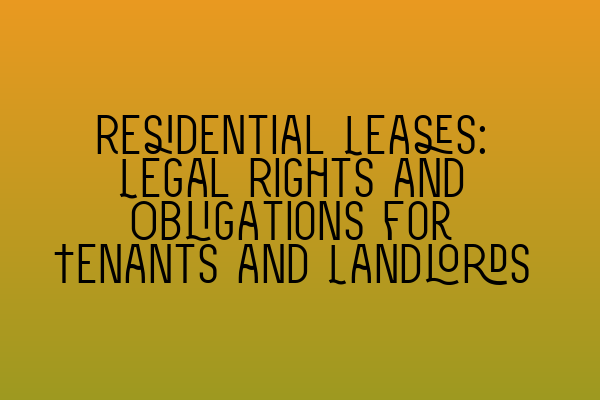Residential Leases: Legal Rights and Obligations for Tenants and Landlords
Introduction
Residential leasing is a common practice in the property market. Whether you are a tenant looking for a new home or a landlord looking to invest in rental property, it is important to understand the legal rights and obligations that come with residential leases. This article will provide an overview of the key aspects that both tenants and landlords should consider.
1. Tenants’ Rights and Obligations
As a tenant, it is crucial to know your rights and obligations to ensure a smooth tenancy. Here are some key points to keep in mind:
a. Right to Habitable Premises: One of the fundamental rights of a tenant is the right to a habitable premises. This means that as a tenant, you have the right to live in a safe and sanitary environment.
b. Rent Payments: Paying rent on time is an essential obligation for tenants. It is important to establish a clear agreement with the landlord regarding the frequency and method of payment.
c. Repairs and Maintenance: Tenants have the right to prompt repairs and maintenance for any issues affecting the habitability of the property. Landlords are responsible for ensuring that the property is in good condition and addressing any necessary repairs.
d. Use of the Property: Tenants must use the property for its intended purpose and abide by any applicable laws and regulations. Any alterations or modifications to the property must be approved by the landlord.
e. Security Deposits: Landlords often require tenants to provide a security deposit at the beginning of the tenancy. This deposit is held as collateral for any unpaid rent or damages to the property. Tenants should be aware of the conditions for the return of the deposit when the tenancy ends.
For a more comprehensive understanding of tenants’ rights and obligations, you can refer to this article on SQE 1 Practice Mocks FLK1 FLK2.
2. Landlords’ Rights and Obligations
Landlords also have rights and obligations that they need to adhere to. Here are some important points for landlords to consider:
a. Right to Collect Rent: The primary right of a landlord is to collect rent from tenants. It is crucial to establish a clear and legally binding rental agreement with tenants that outlines the rent amount, payment schedule, and any consequences for late payments.
b. Property Maintenance: Landlords have an obligation to maintain the property in a habitable condition. This includes addressing repair requests from tenants in a timely manner and ensuring that the property meets health and safety standards.
c. Privacy Rights: While tenants have the right to quiet enjoyment of the property, landlords also have the right to enter the premises for specific reasons, such as repairs or inspections. However, landlords must provide prior notice to tenants and respect their privacy rights.
d. Eviction Procedures: In certain circumstances, landlords may need to evict tenants for various reasons, such as non-payment of rent or lease violations. It is important for landlords to follow the proper legal procedures for eviction to avoid any potential legal issues.
For a more detailed understanding of landlords’ rights and obligations, you can refer to this article on SQE 2 Preparation Courses.
Conclusion
Residential leases come with legal rights and obligations for both tenants and landlords. As a tenant, it is important to know your rights to a habitable premises, pay rent on time, and ensure the property is maintained. Landlords, on the other hand, have the right to collect rent, maintain the property, and follow legal procedures for eviction when necessary.
Understanding the legal framework surrounding residential leases is essential for both parties to ensure a harmonious and lawful tenancy. If you are looking to further enhance your knowledge of property law, you may want to consider enrolling in SQE 1 Preparation Courses to prepare for the related exams.
For an overview of the upcoming SRA SQE exam dates, visit SRA SQE Exam Dates. Additionally, you can test your knowledge with SQE 1 practice exam questions available at SQE 1 Practice Exam Questions.
Remember, seeking professional legal advice from a solicitor specializing in property law is always recommended to ensure that you fully understand your rights and obligations as a tenant or landlord.
